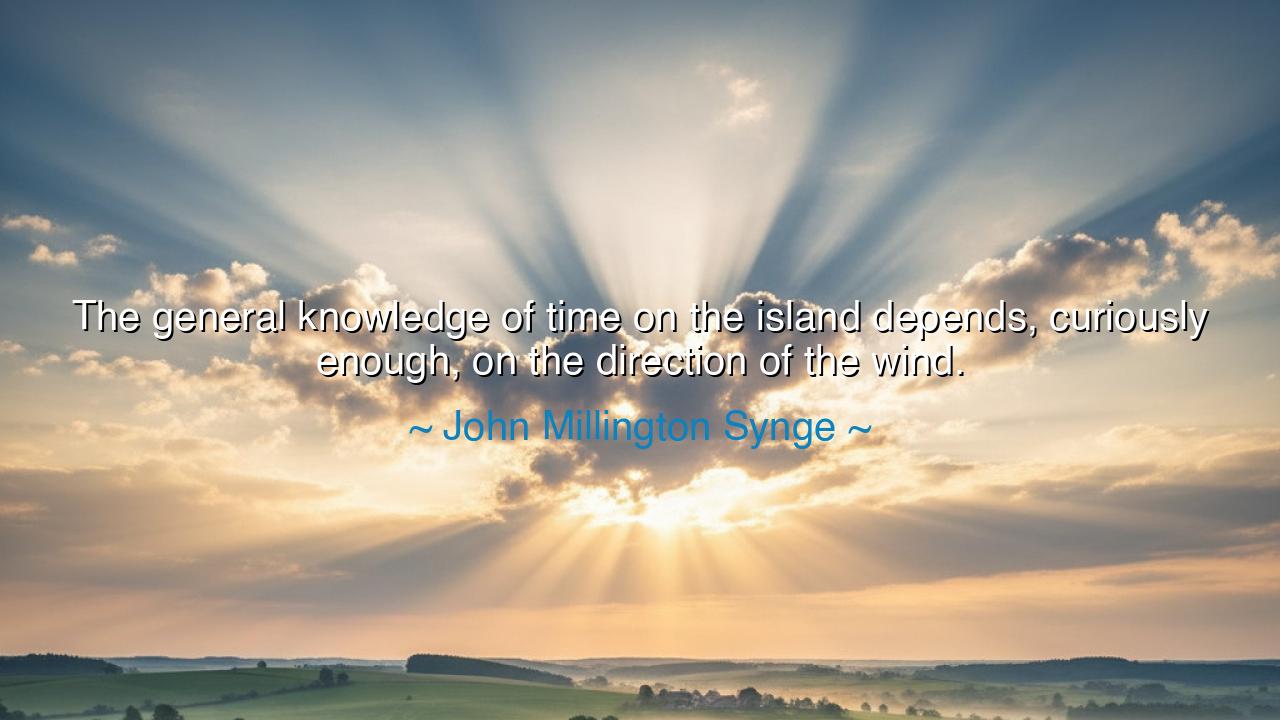
The general knowledge of time on the island depends, curiously
The general knowledge of time on the island depends, curiously enough, on the direction of the wind.






“The general knowledge of time on the island depends, curiously enough, on the direction of the wind.” — John Millington Synge
In this mysterious and poetic line, John Millington Synge, the great Irish playwright and chronicler of the western isles, speaks not only of weather, but of life itself. He writes of a small island off the coast of Ireland—remote, wild, and unhurried—where the people measure time not by clocks or calendars, but by the wind that sweeps over sea and stone. At first glance, his words seem quaint, a mere observation of rustic life. Yet beneath them lies a truth far deeper: that time, for those who live close to nature, is not mechanical but organic, not ruled by the ticking of gears but by the breathing of the earth. The direction of the wind becomes the islander’s clock, a reminder that man’s existence is woven into the rhythms of creation itself.
To understand this quote, we must step into the world that inspired it—the Aran Islands, where Synge lived among fishermen and farmers at the turn of the twentieth century. There, far from the noise of the industrial age, life was a dialogue between man and the elements. The islanders rose when the sea was calm, fished when the wind was kind, and stayed home when storms came roaring from the Atlantic. Their sense of time was not one of hours and minutes, but of tides and tempests. It was a knowledge born of necessity, shaped by the same forces that carved the cliffs and churned the sea. Synge, who sought to capture the soul of Ireland, saw in this way of life a wisdom modernity had forgotten—a wisdom that accepted nature as both teacher and master.
For the direction of the wind determined not only the day’s labor but the heart’s mood. When the soft southern breeze blew, it carried warmth and the promise of clear waters; when the fierce northern gusts arrived, men spoke in quieter tones, knowing the sea would rise. The islanders’ world was thus an intimate conversation with nature. Their knowledge of time was also a knowledge of patience, of adaptation, of surrender and courage. They understood that one cannot command the wind, but one can learn to read it, to move with it rather than against it. In that humility lies the secret rhythm of life—the understanding that true wisdom comes not from control, but from harmony.
Consider how this truth echoes through human history. Long before clocks ruled the day, farmers planted by the moon, sailors set sail by the stars, and monks marked prayer by the movement of light across stone walls. Even great civilizations once lived by the wind and season, not by the tyranny of the minute hand. Yet, as the world grew busier, man’s heart grew detached from the pulse of nature. He began to measure life by production, not by peace; by deadlines, not by dawns. Synge’s island, then, becomes a mirror held to our modern world—a quiet rebuke to the restless soul that has forgotten how to listen to the wind.
The origin of the quote lies in Synge’s work The Aran Islands, his account of life among those rugged shores. But the meaning extends beyond geography. It speaks to all who live caught between nature’s eternal flow and man’s artificial order. For the islander’s way of knowing time is, in truth, the way of wisdom. It is the ability to discern not only the hour of the day, but the season of one’s life—to feel when it is time to act, and when it is time to wait. The wind, in this sense, is not merely weather; it is fate, intuition, the unseen current that guides both the sea and the soul.
Let us then remember what Synge’s simple observation teaches: that we are still, and always, children of the wind. The more we bind ourselves to schedules and machines, the more we lose the music of life’s natural rhythm. To live well is to recover the islander’s awareness—to listen to the quiet signals around us, to sense the changes in our own seasons, to honor the unseen forces that move through our days. For just as the wind shapes the islander’s time, so too does spirit shape the journey of the heart.
So, dear listener, learn again to read the wind. When life grows hurried, pause and look to the world beyond your walls—the clouds, the air, the rhythm of your own breath. Let time be not a chain, but a tide. When the winds of fortune shift, adjust your sails, not your soul. For to live as Synge’s islanders did—to let the direction of the wind guide one’s understanding of time—is to live in harmony with the ancient truth: that the measure of a life is not how many hours it holds, but how deeply it flows with the currents of the world.






AAdministratorAdministrator
Welcome, honored guests. Please leave a comment, we will respond soon